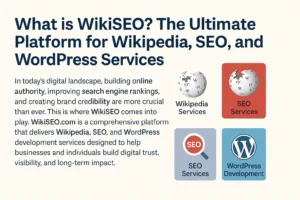Contents
ToggleHow to Get Wikipedia Backlinks Ethically
Introduction
In today’s competitive digital landscape, search engine optimization (SEO) plays a critical role in driving traffic, increasing visibility, and boosting credibility for businesses. One often overlooked yet highly effective strategy is leveraging Wikipedia backlinks. These authoritative links not only enhance a site’s SEO but also contribute to long-term success in digital marketing campaigns. This article will explore why Wikipedia backlinks are valuable, how to obtain them ethically, and the impact they can have on overall SEO performance.

What Are Wikipedia Backlinks?
A Wikipedia backlink is a hyperlink on a Wikipedia page that points to an external website. These links are typically placed within the reference sections of articles and serve as sources of additional information, enhancing the credibility of Wikipedia entries. While Wikipedia links are mostly nofollow, meaning they do not directly pass link equity or PageRank, they still offer numerous SEO benefits.
The Role of Wikipedia Backlinks in SEO
Although Wikipedia backlinks are nofollow, they remain highly beneficial in an SEO context for several reasons:
- Authority and Trustworthiness: Wikipedia is one of the most trusted websites in the world. Links from such an authoritative domain contribute to building trustworthiness and credibility for your website. This plays a role in your site’s E-A-T (Expertise, Authoritativeness, Trustworthiness), which Google considers a critical ranking factor.
- Increased Visibility and Traffic: Pages with Wikipedia backlinks often experience an increase in referral traffic. Users exploring Wikipedia for reliable information are more likely to click through to trusted external sources. This increased exposure can lead to a broader audience discovering your content, leading to long-term traffic growth.
- Boost in Search Rankings: While getting backlinks from Wikipedia are nofollow, they can indirectly boost your rankings. By improving your site’s authority and increasing traffic, these links may encourage other authoritative websites to link to you, passing on valuable link juice.
- Brand Credibility: Having your site referenced on Wikipedia enhances your brand’s credibility in the eyes of users. The trust that people place in Wikipedia often transfers to the external websites linked as references, strengthening your reputation.
How to Get Wikipedia Backlinks Ethically
Obtaining Wikipedia backlinks is a process that requires ethical practices to maintain the integrity of the platform. Follow these steps to ensure you’re building high-quality links without violating Wikipedia’s guidelines:
- Create Valuable, Citation-Worthy Content: The first step to getting a Wikipedia backlink is to produce content that provides significant value. Ensure that your website offers authoritative information or expert analysis on a topic that can be referenced in Wikipedia articles. For example, detailed industry reports, case studies, or expert interviews are often valuable to the Wikipedia community.
- Identify Relevant Wikipedia Pages: Search for Wikipedia articles that are relevant to your niche. Use keywords such as buy Wikipedia backlinks or Wikipedia backlink SEO to find pages related to your industry. Once you identify an article that can benefit from your content, assess whether there are any gaps or missing citations that your website could fill.
- Follow Wikipedia’s Guidelines: Wikipedia strictly prohibits promotional content, so avoid adding links purely for SEO purposes. The content you link to should enhance the article, provide additional insight, and adhere to Wikipedia’s neutrality and sourcing guidelines.
- Contribute to Wikipedia as an Editor: Becoming an active Wikipedia editor allows you to contribute valuable information to the community. Over time, you’ll build a reputation for adding meaningful contributions, increasing the likelihood that your citations will be accepted.
Best Practices for Wikipedia Backlinks
While it’s tempting to focus on quantity, obtaining a few high-quality Wikipedia backlinks is far more effective than adding links to multiple articles without offering value. Below are some best practices:
- Always Provide Accurate, Verifiable Sources: Wikipedia requires citations from reputable, verifiable sources. Articles that provide original research, peer-reviewed studies, or in-depth analysis are more likely to be accepted.
- Avoid Over-Linking: Adding too many links from your website can be seen as spammy and may result in your citations being removed. Be selective and only contribute to articles where your content adds significant value.
- Monitor Links Regularly: Wikipedia editors or bots might remove your link if they deem it irrelevant or promotional. To prevent this, periodically check the status of your links and ensure they remain relevant to the article.
The Impact of Wikipedia Backlinks on SEO
The impact of Wikipedia backlinks service on SEO may not be immediate, but it is long-lasting. While direct ranking benefits from Wikipedia backlink SEO may be limited, these backlinks enhance your site’s authority, which contributes to overall SEO success. Over time, this can lead to:
- Higher Domain Authority: As your website accumulates links from reputable sources like Wikipedia, its domain authority improves, making it easier to rank for other competitive keywords.
- Increased Organic Search Visibility: Websites with higher authority are more likely to appear in top search results, driving organic traffic and increasing visibility.
- Enhanced Brand Reputation: Being cited as a source on Wikipedia strengthens your brand’s reputation as an expert in your field, improving trust from users and search engines alike.
Conclusion
Incorporating Wikipedia backlinks service into your SEO strategy is a smart and ethical way to build credibility, increase visibility, and improve search rankings. While these links may not directly pass PageRank, they provide numerous indirect benefits that can contribute to long-term success. By following Wikipedia’s guidelines, contributing valuable content, and building authority through reputable links, businesses can create a sustainable SEO strategy that stands the test of time.











